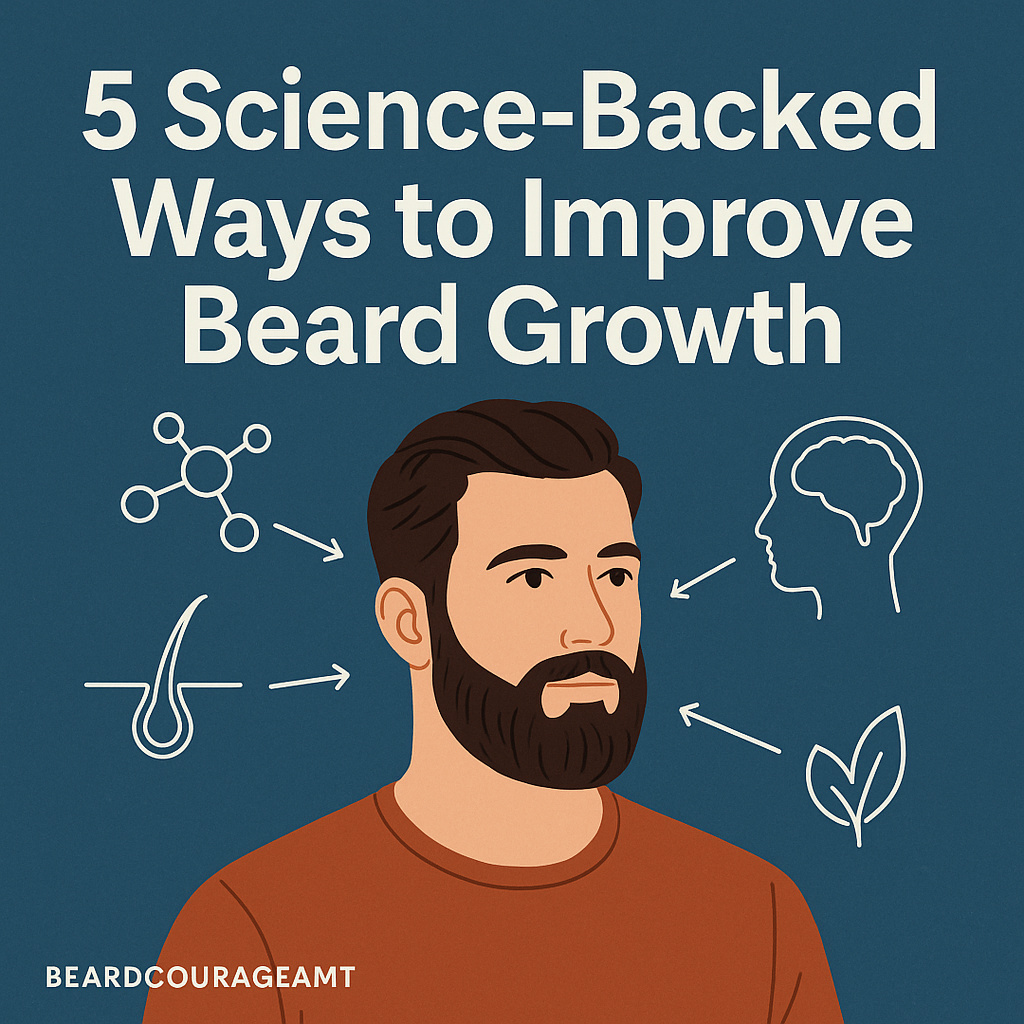
Growing a thicker, healthier beard isn’t just about genetics—it’s also about understanding how your body works and supporting it the right way. While some men can grow facial hair with ease, others struggle with patchiness or slow growth. The good news? Science offers several proven ways to help your beard reach its full potential naturally.
Here are five evidence-based methods to improve beard growth and keep it strong over time.
1. Support Hormone Health Naturally
Testosterone and its derivative, dihydrotestosterone (DHT), play the biggest roles in beard growth. These hormones activate hair follicles and determine how thick and fast your beard grows.
To naturally support healthy testosterone levels:
- Exercise regularly, especially strength training and HIIT. Studies show these workouts can boost testosterone and DHT production.
- Get enough sleep. Poor sleep lowers hormone levels and slows beard growth. Aim for 7–8 hours each night.
- Maintain a balanced diet. Include foods rich in zinc, magnesium, and vitamin D—nutrients directly linked to healthy hormone function.
2. Improve Circulation to the Hair Follicles
Good blood flow delivers oxygen and nutrients to your facial hair follicles, fueling growth. One proven method is facial massage—just a few minutes per day can increase microcirculation and awaken dormant follicles.
You can also boost circulation by:
- Exfoliating your skin twice a week to remove dead cells and unclog pores.
- Applying warm compresses to the face to encourage blood flow.
- Staying active—cardio helps your entire body, including your beard, get better oxygen supply.
3. Eat for Hair Growth
Beard health starts from within. Research shows that certain nutrients can directly influence hair growth cycles:
- Protein: Hair is made of keratin, a protein. Eating enough lean meat, eggs, beans, and nuts supports strong follicle development.
- Biotin (Vitamin B7): Found in eggs, almonds, and sweet potatoes, biotin strengthens keratin structure and promotes hair growth.
- Omega-3 fatty acids: Present in fish, flaxseeds, and chia seeds, these fats reduce inflammation and improve skin and follicle health.
- Iron and zinc: Both are essential for preventing hair thinning and maintaining healthy follicles.
If you struggle to meet these needs through diet, a high-quality beard growth supplement with vitamins D, B-complex, and zinc may help fill the gaps.
4. Keep Your Skin and Follicles Healthy
A healthy beard starts with healthy skin. Clogged pores or dryness can restrict new growth and weaken hair shafts. Dermatologists recommend regular beard and skin maintenance to keep follicles open and nourished.
Here’s what to do:
- Wash your beard with a gentle beard shampoo 2–3 times per week.
- Apply beard oil or moisturizer daily to prevent dryness and breakage.
- Avoid over-washing, which can strip natural oils and slow growth.
- Use a boar bristle brush to evenly distribute oils and gently exfoliate the skin beneath your beard.
5. Consider Proven Growth Aids
While natural methods form the foundation, science also supports a few targeted aids for beard growth. The most studied one is minoxidil, a topical solution that increases blood flow to follicles and can help trigger new hair growth.
Research shows that consistent use of minoxidil can thicken beards over several months, though results vary and patience is key. For best results:
- Apply it to clean, dry skin once or twice daily.
- Be consistent for at least 3–6 months.
- Follow up with beard oil to maintain softness and hydration.
Other emerging aids include microneedling, which uses tiny skin punctures to boost collagen and follicle activation, and red light therapy, which may enhance circulation and cell regeneration.
Final Thoughts
Improving beard growth isn’t about shortcuts—it’s about understanding the science behind what your body needs. By focusing on hormone health, nutrition, circulation, and consistent care, you’ll give your beard the best chance to thrive naturally. Combine these habits with patience, and you’ll soon notice stronger, thicker growth that reflects both health and confidence.
